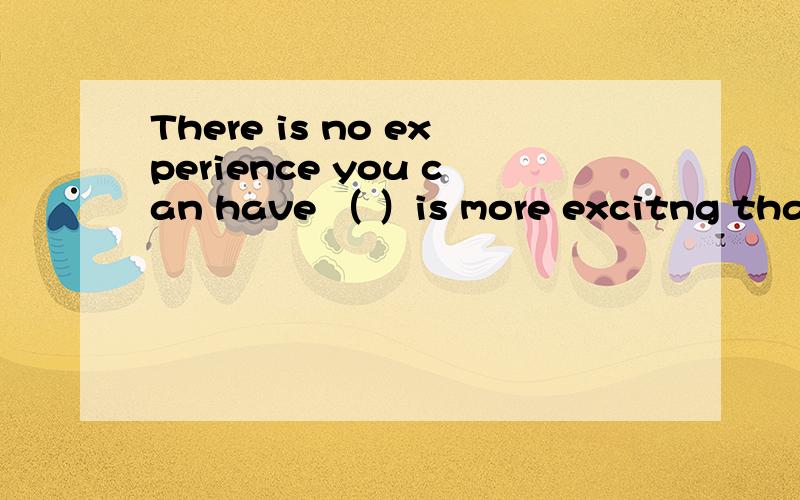There is no experience you can have ( )is more excitng than skating on real ice.为何括号中填what 答案说what is more.是no experience的同位语,到底该怎样分析?像这种由what引导的同位语从句与定语从句如何区分?
来源:学生作业帮助网 编辑:作业帮 时间:2024/04/26 21:27:21

There is no experience you can have ( )is more excitng than skating on real ice.为何括号中填what 答案说what is more.是no experience的同位语,到底该怎样分析?像这种由what引导的同位语从句与定语从句如何区分?
There is no experience you can have ( )is more excitng than skating on real ice.为何括号中填what
答案说what is more.是no experience的同位语,到底该怎样分析?像这种由what引导的同位语从句与定语从句如何区分?麻烦说详细一点,答案就是what没错.
是what引导的同位语从句,我想问下由what引导的同位语从句杂与定语从句区别?是what引导的同位语从句啊!
There is no experience you can have ( )is more excitng than skating on real ice.为何括号中填what 答案说what is more.是no experience的同位语,到底该怎样分析?像这种由what引导的同位语从句与定语从句如何区分?
同位语从句与前面的名词是同位关系,即说明它前面名词的内容;而定语从句与前面的名词是修饰与被修饰关系,即限定它前面的名词范围,或补充一些情况.如:
The news that l have passed the exam is true.我通过了考试这一消息是真的.
(同位语从句,即从句所表达的意思就是前面名词的内容.)
The news that he told me just now is true.他刚才告诉我的消息是真的.
(定语从句,从句对前面名词起修饰限制作用,即“他告诉我的”那个消息,而不是别的消息.)
答案错了呀!应该填that.
由that引导的从句,形容no experience,则此句原为: no experience (替代that这个同位语) is more excisting than...
如果非要用what,就应为There is no experience you can have like what it is for skating on real ice.
There is no experience[ (that)you can have 做experience 的定语]【(what )is more excitng than skating on real ice做experience的同位语 what 做同位语从句的主语】.
what 从句There is no experience you can have